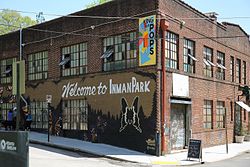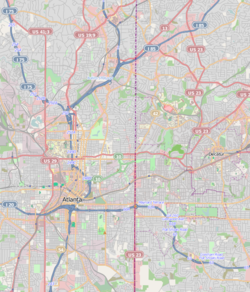Inman Park
|
Inman Park Historic District
|
|

Welcome Sign in Inman Park
|
|
| Location | Roughly bounded by Freedom Parkway, DeKalb and Lake Aves. (original) and Roughly bounded by Lake, Hurt, and DeKalb Aves., and Krog St. (increase), Atlanta, Georgia |
|---|---|
| Coordinates | 33°45′20″N 84°21′34″W / 33.75556°N 84.35944°WCoordinates: 33°45′20″N 84°21′34″W / 33.75556°N 84.35944°W |
| Built | 1889 |
| Architect | Multiple |
| Architectural style | Queen Anne, Shingle Style (original); Queen Anne, Stick/Eastlake, Colonial Revival, Shotgun, Bungalow, Arts & Crafts, Romanesque Revival, Prairie Style, Arts & Crafts Revival, et al. (increase) |
| NRHP Reference # | 73000621 and 01000973 |
| Added to NRHP | July 23, 1973 (original) September 16, 2001 (increase) |
Inman Park is a neighborhood on the east side of Atlanta, Georgia, and its first planned suburb. It was named for Samuel M. Inman.
Today's neighborhood of Inman Park includes areas that were originally designated
The area was part of the battlefield in the Battle of Atlanta in 1864.
Inman Park (proper) was planned in the late 1880s by Joel Hurt, a civil engineer and real-estate developer who intended to create a rural oasis connected to the city by the first of Atlanta's electric streetcar lines, along Edgewood Avenue. The East Atlanta Land Company acquired and developed more than 130 acres east of the city and Hurt named the new suburb for his friend and business associate, Samuel M. Inman. Joseph Forsyth Johnson was hired as landscape designer for Inman Park who included curvilinear street designs and liberal usage of open spaces in his planning.
The Atlanta Constitution in 1896 grandly described Inman Park:
"High up above the city, where the purest breezes and the brightest sunshine drove away the germs of disease, and where nature had lavished her best gifts, the gentlemen who conceived the thought of Inman Park found the locality above all others which they desired. It was to be a place of homes, of pretty homes, green lawns, and desirable inhabitants. And all save those who would make desirable residents have been excluded. . . . It's the prettiest, highest, healthiest and most desirable locality I ever saw. Everybody is friendly and neighborly. . . . And as far as accessibility it ranks second to no residence portion of the city. We have three car lines and frequent schedules."
Like new developments throughout the United States at the time, but in stark contrast to the attitudes prevalent in the neighborhood today, Inman Park was conceived of and promoted as a segregated community.
Moreland Park was by contrast developed as a more traditional, incremental building of sub-divisions as opposed to the grand plan for Inman Park proper.
The arrival of the automobile allowed upper class Atlantans to live in suburbs farther north from downtown workplaces, such as Morningside and what is now considered Buckhead. Inman Park became less fashionable and the exuberant Victorian architecture came to seem dated. The mansions came to be subdivided into apartments.
...
Wikipedia

